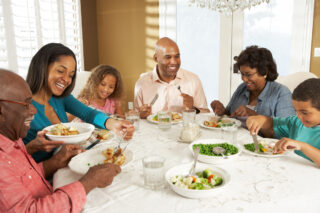
More Weight Control, Nutrition & Exercise Articles
Healthy Eating For The Family

Natural preferences for the foods we enjoy the most are developed, so the challenge in most families is to make healthy choices appealing. Children should be eating whole foods or minimally processed food. We should consume foods that are as close to their natural form as possible.
Restaurant and takeout meals have more added salt, sugar and unhealthy fat. Strive to cook more meals at home, where the family gathers. Everyone can come together and the time spent can offer an opportunity to catch up on the activities of each family member. Get the children involved in shopping for groceries and preparing meals. You can teach them about different foods and how to read food labels. In addition, they are more likely to eat what they helped prepared. Be aware of portion sizes, you can obtain this information on MyPlate.gov. Never insist that your child clean their plate, and never use food as a reward or bribe.
Make healthy snacks available. Keep plenty of fruit, vegetables, and healthy beverages (water, milk, and limited amounts of pure fruit juice) on hand so the children can avoid unhealthy snacks like soda, chips, and cookies.
Be a role model for your children. Their impulse to imitate is strong so don’t ask your child to eat vegetables or fruits while you eat cookies, chips or other less healthy foods.
Healthy Eating Tips For Families On The Go
School Lunches for Your Kids. Pack lunches with whole grains, fruits, lean, all natural meats and healthy snacks, such as nuts and dried fruits.
Healthy Breakfasts – Quick and Easy. Get rid of the sugar-filled neon-colored “breakfast” cereals. There are dozens of great-tasting, all-natural, organic cereals. Also, try a breakfast smoothie. MyPlate.gov
Healthy Snacks in the Car. Have non-perishable healthy snacks in your car for when your little one is hungry on the road. Dried fruits, nuts and healthy individually-packaged snacks are a good option.
Freeze-your meals. If you take the time to make a healthy, homemade meal, they are safe to be placed in a vacuum-sealed container and put in the freezer, they can often keep for several weeks.
Make Time for Sit-Down Meals. Try to have at least three (preferably four) family sit-down meals a week. It helps strengthen the family bond. There is nothing that brings people together like food! It also helps show children the importance of taking time to be with people they love.
Fiber. Not an essential nutrient, performs several vital functions: Natural laxative and may lower cholesterol concentration in the blood. A high-fiber intake also supplied greater amounts of vitamins A, B6, B12, C, niacin, thiamin, riboflavin and folate, as well as the minerals magnesium, iron, zinc, calcium and phosphorus.
Other Articles You May Find of Interest...
- MAY MARKS CELIAC AWARENESS MONTH
- Lifestyle Changes To Lower Cholesterol
- Let’s Get Physical: Making Physical Activity a Part Of Your Family Life
- Bariatric Surgery and Sleep Apnea
- Top 4 Benefits Of Enrolling In Nutrition Courses Today
- Essential Guide to Safely and Effectively Assessing Health Supplements
- Understanding the Role of Peptides in Healing and Recovery

















